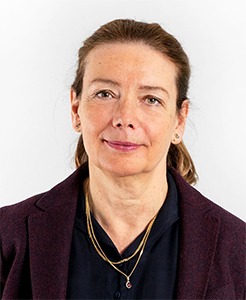Elisabeth Rynning is captivated by the breadth and importance of the legal field for the major issues of human dignity, life and death
Elisabeth Rynning is a Visiting professor of Medical Law at the Department of Law at Uppsala University. Her task is primarily to strengthen the research environment in Medical Law, the subject in which she was previously a Professor between the years 2003 - 2012.
Elisabeth's research in Medical Law began with a thesis work in Public Law, with a leave of absence from the Administrative Court of Appeal in Stockholm. It is almost thirty years since she defended her thesis on the study Consent to medical care and treatment. There, she examined the legal requirements for information and consent in health care, different types of legal liability that can occur if the requirements are not met and how those patients who do not themselves have the ability to give consent have their interests met. Unfortunately, the protection of patients' rights turned out to be rather poor, despite fine declaratory provisions.

Elisabeth Rynning Photo: Charlotte Carlberg Barg
- I was captivated by the breadth and importance of this legal field for the major issues of human dignity, life and death – which affect us all – while it had attracted very little attention in legal research. Medical Law extends into many of the more traditional areas of law and also has International Law and EU Law aspects, she says.
It became a fairly easy choice for Elisabeth not to return to her career in the judiciary but to proceed with the research. There she continued to take an interest in various issues of privacy and self-determination in health care and research, as well as the use of genetic engineering, information technology etc.
- Early on, I found that I enjoyed comparative approaches and collaboration with colleagues in other countries, and therefore participated in many international projects and started the Nordic Network for Research in Biomedical Law. As a strategic initiative at Uppsala University, the first Nordic chair in Medical Law was established in 2003, in a collaboration between the Faculty of Law and the Faculty of Medicine and Pharmacy.
It was ten exciting years as a professor, with many rewarding collaborations, enjoyable projects and fantastically talented doctoral students.
- Of course, I would like to believe that the research of my doctoral students and myself has contributed to drawing attention to and strengthening the rule of law and protection of individuals in healthcare and research, both through our legal science publications and through our participation in education and legislative work in various ways. However, there is still much to be done and some issues have proved surprisingly difficult for the legislature to resolve, including that of decision-making for patients with reduced capacity. At the same time, medical and technological developments are constantly raising new questions.
When Elisabeth came back to the faculty in January, she had been away from academia for almost ten years. In 2012, she became a justice of the Supreme Administrative Court and four years later Chief Parliamentary Ombudsman of Sweden. These were fantastically fun, stimulating and educational assignments, where there have also been opportunities to influence the legal development in my special areas of interest, to some extent, says Elisabeth.
When Elisabeth chose to retire from her full-time job last autumn, she found it a little early to completely let go of her professional life. In addition to the part-time position as a visiting professor, she has, among other things, the assignment as chairman of the board of Sweden's newly formed national human rights institution, the Institute for Human Rights (https://mrinstitutet.se/).
- It's still fun to do new things, but also to return to your old areas of interest! Here in Uppsala, we have started a series of higher seminars in Medical Law and I am also taking part – in a small way – in the faculty's VR project on decision-making for children in medical treatment with uncertain results, concludes Elisabeth.
